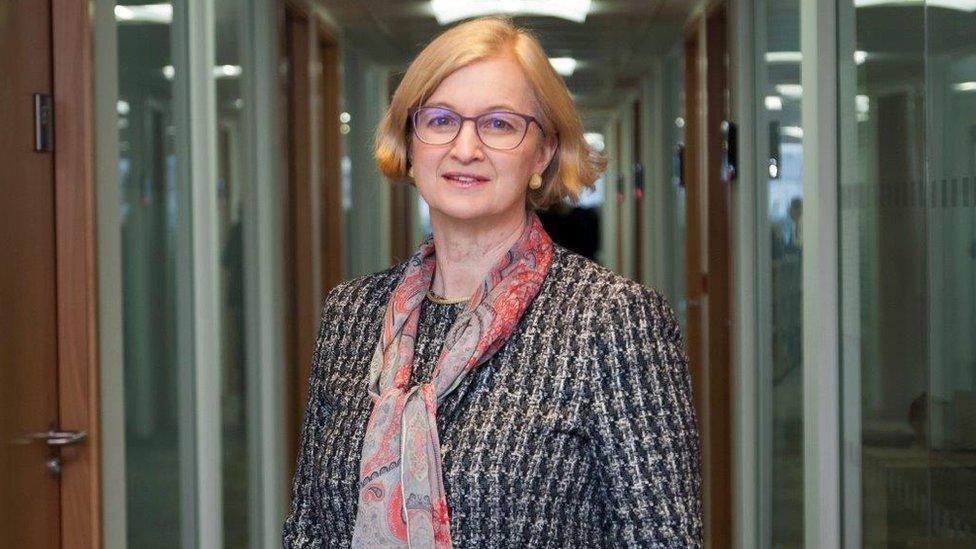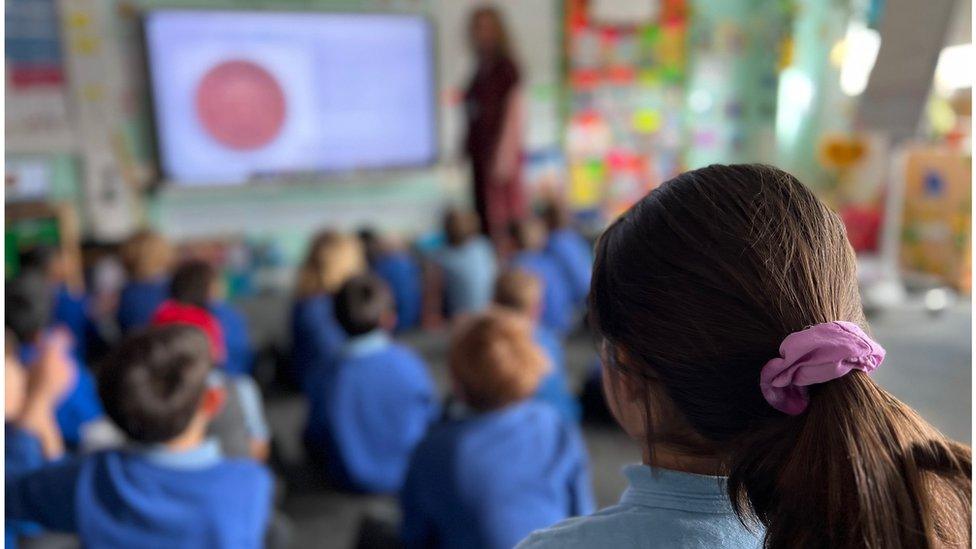Parents more willing to challenge rules - Ofsted
- Published

More than a fifth of pupils in England were persistently absent over the past academic year
Parents are increasingly willing to challenge school rules in England, the head of Ofsted has said.
In her final annual report, Amanda Spielman says the "unwritten agreement" ensuring families take their children to school and respect the policies, in return for a good education, has been fractured.
And restoring the contract between parents and schools "will take time".
Ms Spielman is stepping down at the end of the year.
Her report, external reflects a "broadly positive picture" but draws particular attention to a troubling shift in behaviour, attendance and attitudes towards education since the pandemic.
Looking back on her seven-year term, Ms Spielman says the pandemic has "left a troublesome legacy".
"We see its impact in lower school attendance, poorer behaviour and friction between parents and schools," she says.
Over the 2022-23 academic year, 22.3% of pupils were "persistently absent", missing at least 10% of lessons.
Before the pandemic, the proportion was just over one in 10.
Schools are struggling to reverse this trend, Ms Spielman says, with secondary schools seeing more absences than normal on Mondays and Fridays.
Some of these were due to an increase in mental-health problems, Ms Spielman told BBC Radio 4's Woman's Hour programme, but also "families becoming more relaxed about children missing schools for odd days or term-time holidays".
'School refusal'
Her report also raises concerns about an increase in part-time timetables.
The government says these should be used in exceptional circumstances only and never as a sanction for poor behaviour.
But Ms Spielman says the increase is partly due to a delay in assessments for "school refusal" or special educational needs and disabilities.
She also says it is "incredibly disappointing" Ofsted's powers to investigate and close illegal unregistered schools remain limited despite every one of her previous annual reports highlighting concerns.
"Most of these places offer a poor standard of education and many are unsafe,"' she says.
Ofsted has also seen an increase in parents complaining about school policies and is calling for "greater central guidance" on a range of issues from "uniform policies to the delicate choices around curriculum for relationships and sex education or the handling of transgender and other identity issues", left in large part to head teachers.
"When heads must exercise that autonomy in contentious areas, they can feel isolated and unsupported - and their decisions can be inconsistent" the report says.
Education Secretary Gillian Keegan said her number one priority is making sure "every child is in school every day" and progress is being made, with 380,000 fewer children persistently absent compared with last year.

Amanda Spielman is the longest-serving chief inspector of the watchdog in England
Head teacher Ruth Perry's suicide ahead of an "inadequate" Ofsted rating led to a debate about how the watchdog operates, with calls for its single-word grading system to be replaced with a narrative judgement.
And some changes to Ofsted inspections have already been made, including reinspecting schools rated inadequate over their ability to keep children safe sooner, to give them a chance to improve.
But Ms Spielman says there remains "a wave of publicly expressed discontent" about issues Ofsted cannot resolve alone.
Government interventions in schools, following an inspection, has intensified anxiety ahead of inspections and made them more pressurised, she says.
'More intense'
"Ofsted is not a policy-making department and cannot decide to divert its resources to support work.. yet it is being argued that Ofsted is acting punitively or in bad faith by not doing so and that clarification is needed," Ms Spielman's report says.
The current judgement model is "in fact entirely in line with other inspectorates", she says.
Ms Spielman also says funding for school inspections is about a quarter of what it was 20 years ago, meaning "school inspections are necessarily shorter and more intense and reports are necessarily briefer" - but Ofsted "continues to perform its role fairly, professionally, thoroughly and constructively".
Head-teachers' unions have welcomed the report's findings, while calling for "fundamental reform" of Ofsted.
The changes already made "do not go nearly far enough", National Association of Head Teachers general secretary Paul Whiteman said.
MPs have launched an inquiry into school inspections in England, looking at how useful they are to parents, governors and schools.
- Published13 June 2023

